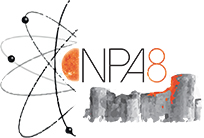Speaker
Stephane Goriely
(Universite Libre de Bruxelles)
Description
The r-process nucleosynthesis and related nuclear challenges
S. Goriely
Institut d’Astronomie et d’Astrophysique, Université Libre de Bruxelles, Belgium
Contact email: sgoriely@astro.ulb.ac.be
The rapid neutron-capture process, or r-process, is known to be of fundamental importance for explaining the origin of approximately half of the A > 60 stable nuclei observed in nature. In recent years nuclear astrophysicists have developed more and more sophisticated r-process models, eagerly trying to add new astrophysical or nuclear physics ingredients to explain the solar system composition in a satisfactory way. Recently, special attention has been paid to neutron star (NS) mergers following the confirmation by hydrodynamic simulations that a non- negligible amount of matter can be ejected and by nucleosynthesis calculations combined with the predicted astrophysical event rate that such events can account for the majority of r-material in our Galaxy
We show here that the combined contribution of both the dynamical (prompt) ejecta expelled during binary NS or NS-black hole (BH) mergers and the neutrino and viscously driven outflows generated during the post-merger remnant evolution of relic BH-torus systems can lead to the production of r-process elements from mass number A >∼ 90 up to thorium and uranium. The corresponding abundance distribution is found to reproduce the solar distribution extremely well and can also account for the elemental distributions observed in low-metallicity stars. However, major uncertainties still affect our understanding of the composition of the matter ejected. These concern (i) the β-interactions of electron neutrinos and electron antineutrinos with free neutrons and protons, as well as their inverse reactions, which may affect the neutron-richness of the matter at the early phase of the ejection, and (ii) the nuclear physics of exotic neutron-rich nuclei, including nuclear structure as well as nuclear interaction properties, which impact the calculated abundance distribution resulting from the r-process nucleosynthesis. Both aspects will be critically discussed in the light of recent hydrodynamical simulations of NS mergers and microscopic calculations of nuclear decay and reaction probabilities.
Primary author
Stephane Goriely
(Universite Libre de Bruxelles)

